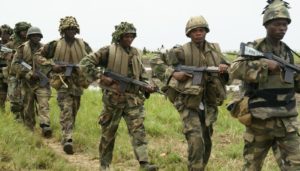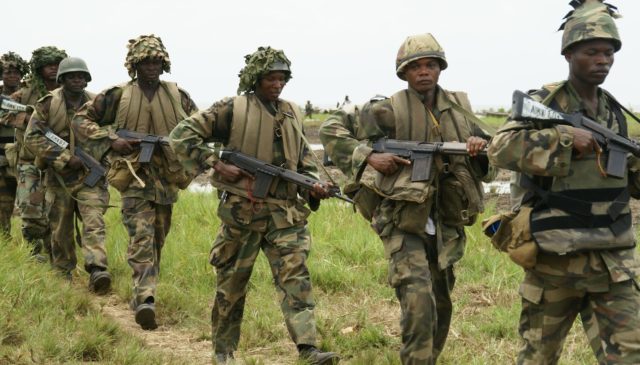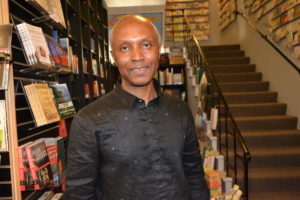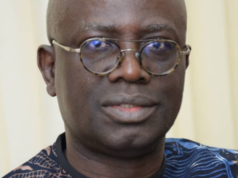 I have argued before that the Nigerian state appears organized around the principle of inflicting maximum emotional aggravation, and, often, severe physical pain, on citizens and other occupants of the space called Nigeria.
I have argued before that the Nigerian state appears organized around the principle of inflicting maximum emotional aggravation, and, often, severe physical pain, on citizens and other occupants of the space called Nigeria.Like most countries, Nigeria has such state organs as the military, the police, the customs, the secret service, and the judiciary. In many other countries, these institutions play wholesome roles, serving to enhance the citizen’s sense of belonging to an organic community. By contrast, in Nigeria these institutions lend themselves to the task of alienating all but the most privileged citizens.
Let’s take one example, the military. Last November, a report by Amnesty International concluded that Nigerian soldiers killed at least 150 unarmed pro-Biafra agitators. That horrific indictment became the latest ledger entry in a national memory of military massacres that includes Odi, Zaki Biam and Zaria. Our soldiers are as likely to take deadly aim at placard-carrying demonstrators as they are to go after members of the insurgent Islamist group, Boko Haram.
The point is that Nigerian institutions hardly ever function to keep the citizen at ease. Instead, they keep her in a constant state of unease, disquiet and anxiety. There is no particular advantage to obeying the law in Nigeria, as the police and other “law enforcement” agencies appear strangely oriented to make life hellish for the law-abiding citizen. Often, the object for state institutions is to bully its victims and to extort cash from as many victims as possible. You don’t have to break the law to get into trouble. Often you get into trouble for NOT breaking the law. To adapt the bizarre rhetoric of many a “law enforcement” officer, any Nigerian police officer “can contravene” you.
On my most recent visits to Nigeria, I became aware of the absurdist excesses of the country’s uniformed men and women. In recent times, every just-appointed Inspector General of Police promised to eliminate police checkpoints from highways. Instead, the checkpoints only ever multiply. It’s as if the pledge to remove the roadblocks were some kind of coded message to intensify the harassment of road users.
In fact, I have never traveled in any other country with as many police checkpoints as Nigeria. Yet, there’s no evidence that the checkpoints deter criminals or constitute effective policing. Most commuters simply experience them as locations where grubby officers engage harried citizens in a wearying game of extortion.
That game is matched in aggravation by another trend, what I’d describe as the privatization of the police. In Nigerian cities and highways, one frequently saw the police in their siren-blaring vehicles in the convoy of some well-oiled Nigerian. These convoys set the tone in reckless speeding and other endangering behavior. In heavy traffic, the police officers lean out of the windows of their escort cars, brandishing guns and horsewhips. Often, the police drivers intimidate other road users by making sharp left and right turns, as if fencing with their cars, forcing other cars off the road.
Almost always, I saw that the license plates of all the vehicles in a convoy were concealed. I can hardly imagine a more lawless situation. It means any car in the convoy could wreck your car in an accident or, worse, maim or kill somebody in absolute anonymity. Victims have no way of identifying the car that hit them or the operators of the vehicles. Alas, the police that should be in the business of enforcing the law have invented a new way to violate one of the most basic and commonsensical rules of traffic: that each vehicle on the road should have a license plate by which to identify it.
In effect, instead of maintaining law and order, the police act as agents of lawlessness and disorder. They gleefully serve as accessories to crime, enabling wealthy citizens to destroy the property of the less privileged—and sometimes even to cause grave bodily injury or death—without any consequences.
Traffic harassment aside, one of the many other ways Nigerian agencies importune citizens and visitors alike is by invoking laws or regulations that have neither rhyme nor reason.
I remember when it was some sort of crime, years ago, to take photos anywhere within or near Murtala Muhammed Airport in Lagos. I don’t know who made the decision, but somehow the idea had emerged that to take any photo that revealed the interior or exterior of the airport amounted to imperiling the security of the airport. I once saw security agents descend on a young man who posed outside the airport for a photo shot. The agents questioned him brusquely, and then took him away to their offices. Poor fellow, his film must have been exposed to expunge the photo he took. And that would have been a lucky break. In all likelihood, before his ordeal ended, he would have parted with some appeasement cash.
I have never been at another airport where it was prohibited to take photos. The no-photo policy at MMA made no sense. I remember arguing with a friend who defended the policy. The airport, he said, was one of Nigeria’s most strategic assets, and allowing people to photograph it could hand a critical blueprint to potential terrorists or an invading foreign military force. I reminded my interlocutor that a newsstand inside the airport building sold color posters of MMA. At any rate, the architectural design for the airport could be easily obtained.
Each time I leave Nigeria, I take with me some of the country’s favorite foods—gari, ground egusi, crayfish, ogbono, ukwa, bitterleaf. This occasions interesting interactions with customs officials. Somehow, these officers invoke an absurd requirement that any foodstuff leaving Nigeria must have a “quarantine” certificate.
My suspicion is that the quarantine provision pertains to commercial quantities. But customs officers at airports have seized on it to extort bribes from people traveling abroad. As a policy, I neither accept nor give bribes. On one occasion, as I would not offer a bribe to the customs officers and they would not let me proceed to check in my bags with the food, I asked a brother who saw me off to take back the food.
In mid-January, on my way back to the US, I had yet another encounter with customs officers on the quarantine matter. After ascertaining that I had food in my suitcases, the female officer asked what food I would give her to eat. I joked that she didn’t look hungry to me. Once she sensed I wasn’t going to “cooperate,” she demanded my quarantine certificate. I retorted that the so-called policy was silly. “Do you quarantine the food you eat?” I asked.
Soon, she called in her supervisor. He informed me that the government set up the quarantine policy to ensure that any food that left the shores of Nigeria met “international standards.” I asked him the same question about the food he ate at home. I also told him it should be the concern of the US government, not Nigeria’s, whether the food I brought in met US standards. He didn’t find my argumentativeness funny.
“Okay, you must go and do quarantine,” he decreed. I followed him to a short distance away, to an enclosure where a man sat in a kind of bored stance. The “quarantine” officer then lectured me anew on quarantine and “proper procedures” for packing food: it should be in clear plastic containers, well sealed. He then gave me a form to fill, listing all the food I was taking with me. He said there was a fee of N2000 for the quarantine process. I paid, only after demanding and getting a receipt.
Chances are that the money I paid never made it into the Nigerian government’s account. But the larger question is, why do Nigerian institutions excel in ludicrous rules designed to give grief to citizens?
(okeyndibe@gmail.com)









Nigeria needs a profound cure in all aspects. It is good to see how you analyse these situation intelligently. Solutions imposes to be sought. Only if everyone is conscious
Comment: in fact the police are stealing from the people instead of protecting them, I pray God wil help these country in every aspect.